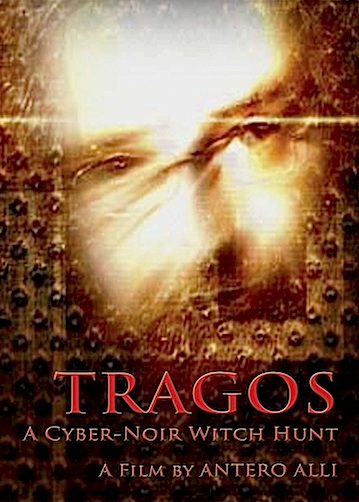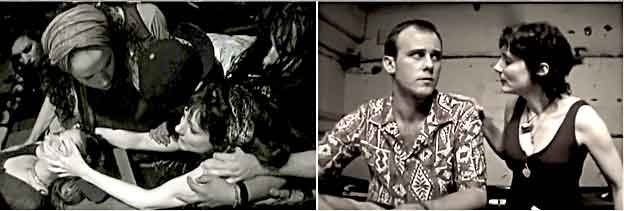 This, if you ask me, is the most interesting film made by the underground auteur Antero Alli. Like Alli’s other films (which include THE ORACLE, UNDER A SHIPWRECKED MOON and THE VANISHING FIELD), TRAGOS: A CYBER-NOIR WITCH HUNT (2000) is a shot-on-video reverie that all-but flaunts its non-commerciality.
This, if you ask me, is the most interesting film made by the underground auteur Antero Alli. Like Alli’s other films (which include THE ORACLE, UNDER A SHIPWRECKED MOON and THE VANISHING FIELD), TRAGOS: A CYBER-NOIR WITCH HUNT (2000) is a shot-on-video reverie that all-but flaunts its non-commerciality.
A virtual reality thriller, TRAGOS pays more lip service to things like storytelling and characterization than most of Alli’s other pictures, although his trademarks—dissolve-heavy computerized imagery, wildly pretentious dialogue (“This was my moment to disappear into the moment before me”), a heavily anthropologic subtext—are very much in evidence.
The focus is on a tribe of “techno-pagans.” These cultists like to gather in a bed-lined barracks and imbibe copious amounts of drugs before jacking into a virtual reality community called Tragos. This realm, created by the group’s founder Alexander Luxor, provides its participants with “high risk primordial rituals of virtual sacrifice.”
When Luxor’s daughter Viveca dies while jacked into Tragos her sister Bella is charged with murder, but found innocent by a jury. The prosecuting attorney, a fundamentalist nut named Bob Logos, believes Bella is a witch and becomes determined to take down her and the Tragos Cult. He hires Stretch Albright, an eccentric private investigator, to infiltrate the group. His efforts, however, are not really necessary, as the cult is in the midst of destroying itself, with its members finding Tragos increasingly—and dangerously—seductive, and so justifying, it would seem, the media’s portrayal of the group as a suicide cult.
Many provocative issues are brought up by TRAGOS, including the seduction of religion and how computers can be substituted for it (a prescient concept indeed), the destructive influence of the media (an aspect that could have stood to be dialed up a notch) and the power of love, as demonstrated by Stretch falling for Bella and jeopardizing his assignment. It all adds up to a credible piece of science fiction that constructs a well-rounded future world with its own rules and terminology (with Alli also including some none-too-subtle self-homages, including the term “Drivetime,” the title of a 1995 Alli feature).

The film’s depictions of virtual reality are reasonably striking given Alli’s non-budget, with flesh and blood actors superimposed over flickery backgrounds created by 90s-era (i.e. primitive) computer animation that’s presented in full color (with the “real” scenes in black and white). Another component of the VR scenes are songs sung by Antero’s wife Sylvi Alli, who also co-produced the film and plays the ghost of Viveca in a variety of gaudy costumes; this being an underground production (with a budget that, like those of most of Alli’s other films, reportedly consisted of a few thousand dollars), many of the cast doubled as crew members.
On the downside, the private eye movie angle—the “Noir” portion of the title—depicted in the scenes with Stretch Albright (complete with exaggerated noirish narration) feels forced and unnecessary. Not helping matters at all is the uniformly bad acting, which is rendered all the more noticeable by the tacky pre-digital video stock. Video is of course the conveyor of unvarnished reality, and here that’s not such a good thing.
Vital Statistics
TRAGOS: A CYBER-NOIR WITCH HUNT
Vertical Pool
Director: Antero Alli
Producers: Antero Alli, Sylvi Alli
Screenplay: Antero Alli
Cinematography: Dan Schmeltzer
Editing: Antero Alli, Christopher Odell
Cast: Barbara Jaspersen, Neil Howard, Bobby Weinapple, Lee Vogt, Lea Bender, Robert Hamm, Felicia Faulkner, Susan Gard, Sylvi Alli
